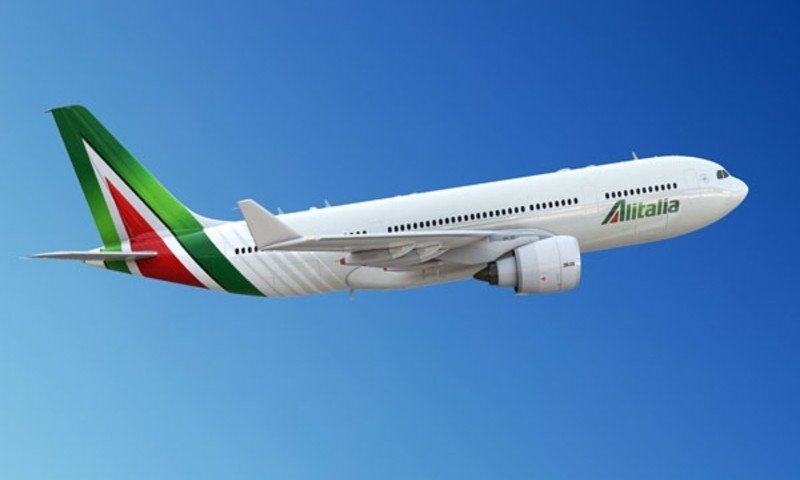L’ultimo volo di Alitalia
15 Ottobre 2021
di Stefano Olivari

La scorsa notte Alitalia ha volato per l’ultima volta? Si direbbe di sì, a leggere gli articoli commossi di gente che ha sempre viaggiato a spese della propria azienda ma anche del resto degli italiani, visto che molte rotte erano in perdita strutturale e certo non per colpa dei vassoietti del pranzo. E invece no, perché la nuova Ita partirà sì con un organico di sole 2800 persone, ma le rimanenti 7600 alla fine della cassa integrazione, settembre 2022, saranno quasi certamente poi pagate con una legge ad hoc: il numero è potenza, diceva quel tale. L’idea di trovarsi in piazza a Roma, perché la maggior parte di quei 7600 sono romani o romanizzati, una folla di disoccupati non piace a nessuno. Gente arrabbiata a Canazei o a Soverato ha meno riscontri mediatici, di solito, a meno che non sia funzionale al Formigli o al Del Debbio della situazione.
Di più: Alitalia sopravviverà anche come marchio, visto che Ita (Italia Trasporto Aereo, con marchio ITA Airways) ha per 90 milioni acquistato il marchio stesso ed il dominio alitalia.com. Insomma, tutto assomiglia a quei fallimenti pilotati del calcio, ripartendo dalla Serie B che è sempre meglio della scomparsa. Certo nel calcio a volte i conti tornano, mentre con Alitalia non è quasi mai successo. Si può quindi dire che le fantasie sessuali sulle hostess le abbiamo pagate carissime, essendo stati i lavoratori Alitalia fin quasi ai giorni nostri pieni di privilegi di ogni tipo, dai babypensionamenti a tanti altri.
Bisogna anche ricordare che Ita è partita con 750 milioni di euro di soldi pubblici, che dovrebbero arrivare a 3 miliardi. Nessuna boccata d’aria, quindi: questa Ita-Alitalia ridimensionata come personale e come slot è quindi in tutto e per tutto un’azienda statale, all 100% di proprietà del Ministero dell’Economia. Come del resto a controllo statale è stata dalla sua fondazione, nel 1946 con nome diverso, fino al 2009 quando in mezzo all’ennesima sua crisi finanziaria Berlusconi si inventò i mitici capitani coraggiosi (Benetton, Colaninno, Marcegaglia, Ligresti, eccetera) di C.A.I., che insieme ad Air France hanno prolungato l’agonia fino all’accordo con Etihad e poi, nel 2017, all’amministrazione straordinaria terminata con questo gioco di prestigio.
Fra l’altro, tanto per stare sull’attualità della corsa senza esclusione di colpi alla presidenza della Repubblica, dove sono in tanti a sperare (fin quasi al livello Casini-Veltroni), il primo ad aprire Alitalia ai capitali privati fu Romano Prodi (lo stiamo vedendo in ogni trasmissione, gli manca solo Il Grande Fratello Vip) negli anni Novanta. Quasi meglio i bond argentini.
Detto che le stime su quanto Alitalia sia costata allo Stato variano da 9 a 14 miliardi di euro, prima del solito pistolotto contro l’inefficienza e le logiche clientelari del settore pubblico (nel caso specifico evidenti) ci chiediamo e vi chiediamo: avere una compagnia di bandiera è strategico e quindi doveroso a prescindere dai costi? Si pensi alle ricadute sul turismo e su altre situazioni, anche di sicurezza nazionale. Non è quindi una domanda retorica (la nostra risposta è sì), viste le tante oscene privatizzazioni dagli anni Novanta in avanti, senza scomodare il Britannia.
Did Alitalia fly for the last time last night? You would think so, reading the emotional articles of people who have always travelled at the expense of their company but also of the rest of Italians, since many routes were structurally loss-making and certainly not because of lunch trays. But no, because the new Ita will start with a staff of only 2800 people, but the remaining 7600 at the end of the redundancy fund, September 2022, will almost certainly be paid with an ad hoc law: the number is power, said that man. Nobody likes the idea of finding themselves in the square in Rome, because most of those 7600 are Roman or Romanised, a crowd of unemployed. Angry people in Canazei or Soverato usually get less media coverage, unless they are functional to the Formigli or Del Debbio of the situation.
What’s more, Alitalia will also survive as a brand, since Ita (Italia Trasporto Aereo, under the ITA Airways brand) has bought the brand itself and the domain alitalia.com for 90 million. In short, everything resembles those piloted bankruptcies in football, starting from Serie B, which is always better than disappearing. Of course, in football, the accounts sometimes add up, while with Alitalia it has almost never happened. It can therefore be said that we have paid dearly for our sexual fantasies about stewardesses, since Alitalia workers have been full of privileges of all kinds, from early retirement to many others, almost up to the present day.
We must also remember that Ita started with 750 million euros of public money, which should reach 3 billion. No breath of fresh air, therefore: this Ita-Alitalia, downsized in terms of personnel and slots, is therefore in all respects a state-owned company, 100% owned by the Ministry of the Economy. Just as it has been state-controlled since its foundation in 1946, under a different name, until 2009 when, in the midst of yet another financial crisis, Berlusconi invented the legendary courageous captains (Benetton, Colaninno, Marcegaglia, Ligresti, etc.) of C.A.I., who, together with Air France, prolonged its agony until the agreement with Etihad and then, in 2017, the extraordinary administration that ended with this sleight of hand.
By the way, just to keep up with the current no-holds-barred race for the presidency of the Republic, where so many are hoping (almost to the level of Casini-Veltroni), the first to open Alitalia to private capital was Romano Prodi (we are seeing him on every show, all he needs is Big Brother Vip) in the 1990s. Almost better the Argentine bonds.
Having said that estimates of how much Alitalia has cost the state vary from 9 to 14 billion euros, before the usual rant against the inefficiency and the clientelistic logic of the public sector (in this specific case obvious) we ask ourselves and we ask you: is having a national airline strategic and therefore necessary regardless of the costs? Think of the impact on tourism and other situations, including national security. It is therefore not a rhetorical question (our answer is yes), given the many obscene privatisations since the 1990s, not to mention Britannia.
Translated with www.DeepL.com/Translator (free version)





Commenti Recenti